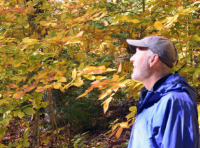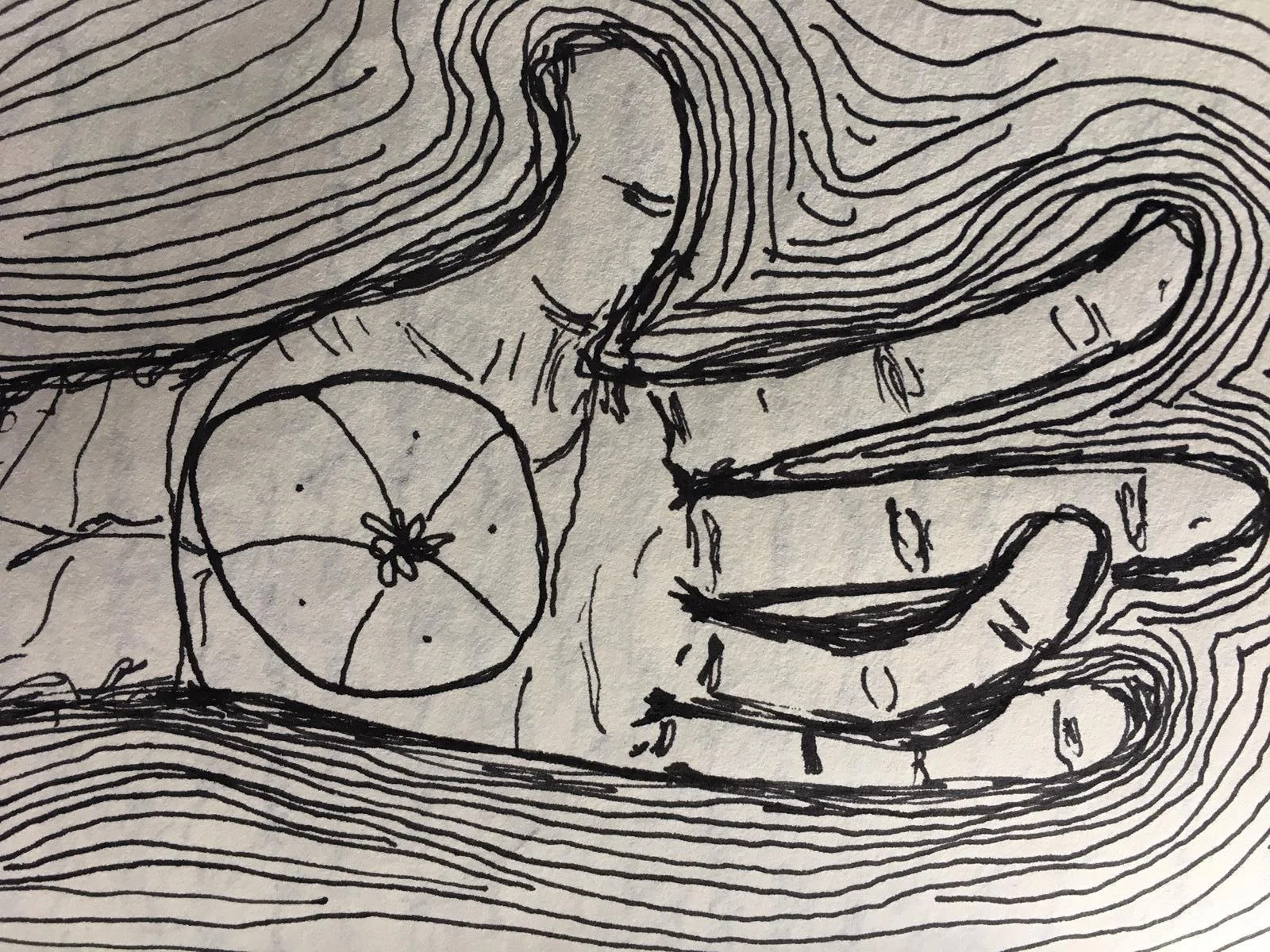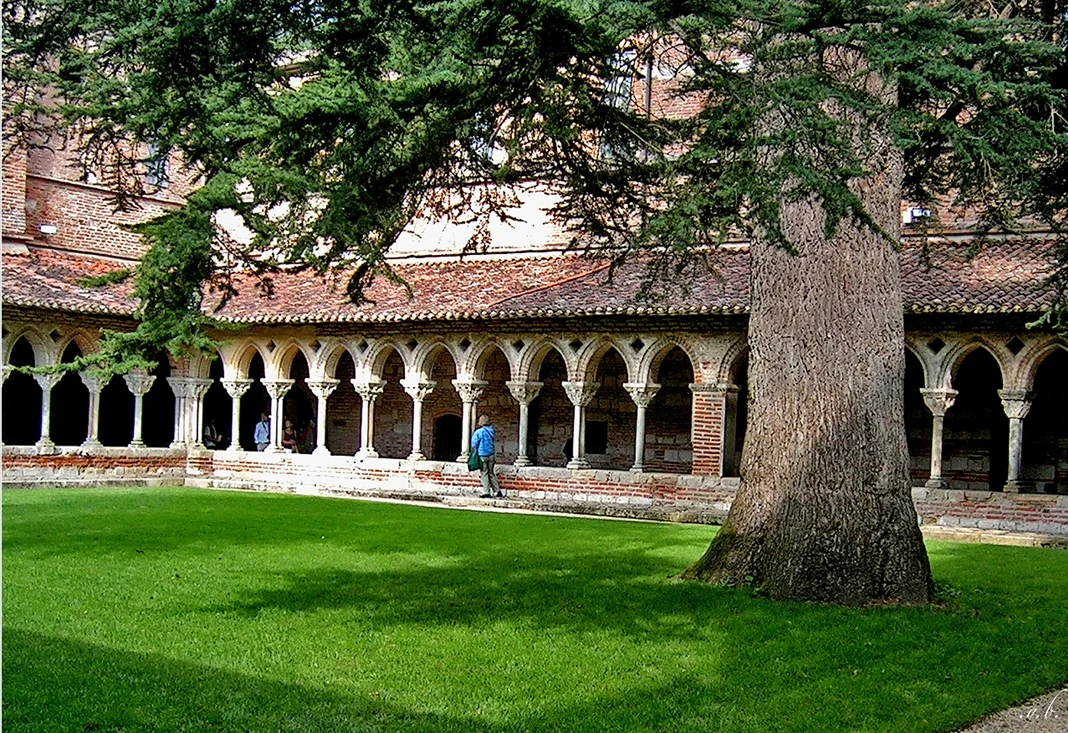A Chainsaw Eucharist (Rev. Steve Blackmer)
I’ve been in the woods a lot lately, clearing trails at Church of the Woods. Last week, I pulled my sled – filled with chainsaw, ax, oil and gas, and various other gear – a mile or so into the woods. I was going to clear out a thick area of blow-downs, saplings, and larger trees along the route of one of our planned walking meditation (and cross-country ski) trails.
I arrived at the work site, started the chainsaw, and began to cut up a big poplar that had fallen across the trail-to-be. When that was done, I moved up the hillside to tackle the decayed beech that had dropped its large branches criss-cross where the trail would go. A few black birch trees were standing in the way, so I felled them first. Then I cut up the beech branches, pried as many as I could from the frozen ground, and moved on to the next bit of work – felling a dozen other beeches and maples up the slope. I cut two or three of the littler ones, and then – as I touched the biting edge of the saw to the living wood of the largest tree, I paused, disturbed by something not right. I realized I was about to take a life – indeed, had already taken several lives – and I had been utterly oblivious of the enormity of that act.
I can’t say I was overcome with remorse and weeping, because I wasn’t. But I did feel regret for not paying more attention, for not recognizing the lives I was ending, for not honoring the trees. I continued with my work, dropping trees right and left, but from that point I tried at least to be aware and to offer silent thanks to each tree as I cut its life short.
By the end of a couple of hours, I had cleared a swath about 10 feet wide and 200 yards long – a nice bit of progress. I had felled – killed – maybe 20 trees. I was content with my work. But I felt a lingering discomfort that I had fallen short, failed, lost the way. In more traditional language, I had sinned. Not for cutting the trees, I think, but for being unaware of what I was doing. For not remembering that a tree (and everything else) is inherently worthy of reverence. For not giving thanks for the trees that had given themselves so I could make this contemplative path. And for not celebrating and thanking the Source of these and all trees.
So, being a priest (and still learning what that entails), I performed a ceremony to restore right relationship – a relationship of love, reverence, and thanksgiving – among me, the trees, and the Source. As it happened, that morning I had – for the first time ever, God only knows why – put a little prayer kit into the sled alongside the saw. Taking the kit out, I placed the Church of the Woods liturgy, a prayer book with the Biblical readings for the day, a few crackers, and a small bottle of communion wine on one of the fresh stumps. Kneeling on the sawdust-covered ground, I opened the prayer book to the day’s first reading, from the great Hebrew prophet, Isaiah, and read:
I have swept away your rebellions like a cloud, and your sins like fog. Return to me, for I have redeemed you. Sing, O heavens, for God has done it. Shout, O depths of the earth! Break forth into singing, O mountains, O forest, and every tree in it. (Isaiah 44: 22-23)
How appropriate! I continued with a prayer of restoration (otherwise known as the confession of sin) and, in company with the trees, offered a service of Thanksgiving (in Greek, Eucharist). I offered a morsel of the consecrated cracker and wine to the trees, both cut and uncut, as beloved members of the community of God. By the close, as our Eucharistic prayer says, we were “reunited with God, with the Earth, and with one another,” and sent forth transformed and renewed.
Bishop Kallistos Ware of the Greek Orthodox Church has written:
Consciously and with deliberate purpose, man (sic) can do two things that the animals can do only unconsciously and instinctively. First, man is able to bless and praise God for the world (italics original). Man is best defined not as a “logical” but as a “eucharistic” animal. He does not merely live in the world, think about it, and use it, but he is capable of seeing the world as God’s gift, as a sacrament of God’s presence and a means of communion with him. So he is able to offer the world back to God in thanksgiving… Secondly, besides blessing and praising God for the world, man is also able to reshape and alter the world, and so to endue it with fresh meaning. [And], man is not just a logical and eucharistic animal, but he is also a creative animal…This creative role he fulfills, not by brute force, but through the clarity of his spiritual vision; his vocation is not to dominate and exploit nature, but to transfigure and hallow it. (The Orthodox Way, pp. 53-54)
At the outset of my day’s work, I had, alas, been merely “living in the world and using it.” I cut trees swiftly and efficiently, reshaping and altering the woods to suit my will. Notwithstanding that I was doing so with a semblance of spiritual vision – to create a contemplative pathway through thick woods – I was not “hallowing nature.” But through the ritual action of becoming aware, of acknowledging, blessing, and thanking the trees, and through the act of communion, something changed.
A chainsaw Eucharist changed me and, therefore, changed my relationship with the trees, the Earth, and God. Through this, the brute felling of trees was transformed into a creative and eucharistic transfiguration of the woods. Through the mystery of the ritual, right relationship had been restored.
Now, truly, I could say, Break forth into singing, O mountains, O forest, and every tree in it! At the close of the Eucharist, I was charged with a deeper awareness, and a greater respect, reverence, and love.
I know that even with this experience, I will continue to fall short. But I will keep trying.
After this, I wonder what we and the world would be like if we always recognized all of Nature (including people) as filled with sacred identity and inherently worthy of reverence. How would our relationship with the Earth and with each other be different if we were always as mindful as I was in that brief ritual moment? If all our actions were “not to dominate and exploit nature, but to transfigure and hallow?” If everything was done with awareness and reverence and a vision of the world as holy?
What would the world be like, then? Can a chainsaw Eucharist help show the way?
###
In 2009, Rev. Steve Blackmer stepped away from a 25 year career in conservation to go to church for the first time, be baptized, attend Yale Divinity School, and become a priest. Check out his pioneering work at: Church of the Woods/Kairos Earth.








